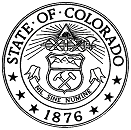![]() The information on this page is archived and provided for reference purposes only. It may be outdated or no longer maintained.
The information on this page is archived and provided for reference purposes only. It may be outdated or no longer maintained.
Coffman Applauds Veto
But Weakening Colorado’s Driver’s License through Rulemaking Still Bad Policy That Threatens Public Safety, Coffman Warns
Denver, June 1, 2007 – Secretary of State Mike Coffman today applauded Governor Bill Ritter’s veto of HB07-1313, legislation that would have expanded the documentation that can be used to obtain a Colorado driver’s license or photo identification card, therefore severely weakening these state-issued documents for identification purposes.
Opposition to the legislation grew to a fever pitch in recent weeks with the Aurora Sentinel, Durango Herald, Fort Collins Coloradan, Pueblo Chieftain, Rocky Mountain News, and just today, the Denver Post and the Grand Junction Sentinel using their editorial pages to urge a veto. During a press conference at the State Capitol last month, Coffman stood with former Governor Dick Lamm and members of the law enforcement community to call on Ritter to veto the legislation. “This bill presents a clear security threat to our nation,” Governor Lamm said at the time.
“I applaud Governor Ritter’s veto of House Bill 1313,” Coffman said today. “This bill would have threatened public safety by weakening the integrity of Colorado’s driver’s license as an identification document.”
Coffman acknowledges that there have been legitimate cases in which citizens were denied a driver’s license when they ought not to have been; HB07-1313 was a misguided attempt to address those concerns. Governor Ritter already has the authority to make any changes he feels are necessary to the current system of issuing Colorado driver’s licenses or photo ID cards through the rulemaking process within the Department of Revenue, Coffman said.
“However, I caution the Governor that any changes he makes to the system not compromise public safety or lead to an increase in identity fraud,” Coffman said. “This legislation went too far, essentially watering down the driver’s license to a meaningless document. I strongly urge Governor Ritter to strike a more balanced position on this issue, and I look forward to participating in the public rulemaking process to address any problems with the current system.




 Menu
Menu  Search
Search 
